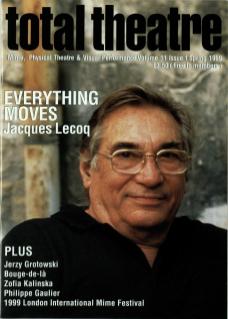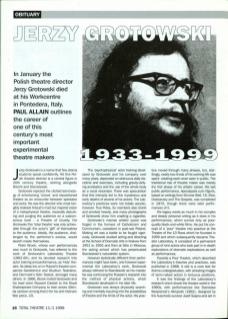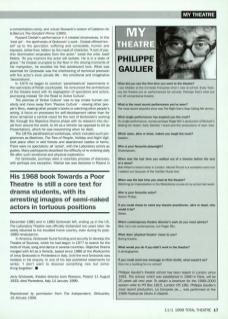Jerzy Grotowski is a name that few drama students speak confidently. Yet this Polish theatre director is a central figure in 20th Century theatre, ranking alongside Brecht and Stanislavski.
Grotowski rejected the clichéd terminology of entertaining 'shows' and repositioned theatre as an encounter between spectator and actor. He was the director who most tangibly realised Artaud's mad but inspired vision of a metaphysical theatre, viscerally disturbing and purging the audience on a subconscious level – a Theatre of Cruelty. For Grotowski this 'total theatre' was only achievable through the actor's 'gift' of themselves to the audience. Ideally, the audience, challenged by the performer's excess, would search inside themselves.
Peter Brook, whose own performances owe much to Grotowski, has referred to the work of Grotowski's Laboratory Theatre (1962-84), and its devoted research into actor training and performance, as 'Holy' theatre. Its ideas live on in Poland's theatre companies Gardzienice and Studium Teatralne, and Denmark's Odin Teatret, amongst many others. In 1966, Brook invited Grotowski and his lead actor Ryszard Cieslak to the Royal Shakespeare Company to train actors (Glenda Jackson among them) for his anti-Vietnam War piece, US.
The 'psychophysical’ actor training developed by Grotowski and his company over many years, depended on strenuous daily discipline and exercises, including gravity-defying acrobatics and the use of the whole body as a vocal resonator. There was speculation that this intensity led to the mysterious and early deaths of several of his actors. The Laboratory's practices were not totally ascetic, however. True Poles, its members also drank and smoked heavily, and many photographs of Grotowski show him cradling a cigarette.
Grotowski's intense artistic quest was forged in the furnace of Catholicism and Communism, coexistent in post-war Poland. Making art was a battle to be fought vigorously. Grotowski studied acting and directing at the School of Dramatic Arts in Krakow from 1951 to 1955 and then at Gitis in Moscow, the acting school which has perpetuated Stanislavski's naturalistic system.
However stylistically different their performances might have been, and however experimental the Laboratory's work, Grotowski always referred to Stanislavski as his master. He was continuing the Russian's research into the method of physical actions, which Stanislavski developed in his later life.
Grotowski was always physically searching and mentally inquiring into the possibilities of theatre and the limits of the actor. His practice moved through many phases, but, startlingly, nearly two-thirds of his working life was spent creating work never seen in public. The traditional role of theatre-maker was merely the first phase of his artistic career. His last public performance, Apocalypsis cum Figuris, based on writings from Simone Weil, T.S. Eliot, Dostoevsky and The Gospels, was completed in 1970, though there were later performances of it.
His legacy exists as much in his complex and deeply personal writing as it does in his performances, which survive only as poor quality black-and-white films. He put his concept of a ‘poor' theatre into practice at the Theatre of the 13 Rows which he founded in 1959 and which subsequently became Theatre Laboratory. It consisted of a permanent group of nine actors who took part in in-depth explorations of dramatic explorations as well as performances.
Towards a Poor Theatre, which described the Laboratory's theories and practices, was published in 1968. It still is a core text for drama undergraduates, with arresting images of semi-naked actors in tortuous positions.
It was the findings of the Laboratory's research which shook the theatre world in the 1960s, with performances like Stanislaw Wyspianski's Akropolis (1962), designed by the Auschwitz survivor Jozef Szajna and set in a concentration camp, and Juliusz Slowacki's version of Calderon de la Barca's The Constant Prince (1965).
Ryszard Cieslak's performance in it created shockwaves. In this 'total act' – the apotheosis of Grotowski's work – Cieslak offered himself up to the spectator, suffering and vulnerable, human and exposed, rather than hidden by the mask of character. ‘A sort of psychic illumination emanates from the actor,’ wrote the critic Josef Kelera. ‘At any moment the actor will levitate. He is in a state of grace.’ As Cieslak crumpled to the floor in the closing moments of his martyrdom, he recalled his first adolescent love. What was essential for Grotowski was the intertwining of technical precision with the actor's inner private life – the emotional and imaginative 'associations’.
His 1968 book Towards a Poor Theatre is still a core text for drama students, with its arresting images of semi-naked actors in tortuous positions
In 1970 he began to conduct 'paratheatrical’ experiments in the vast tracts of Polish countryside. He renounced the architecture of the theatre event with its segregation of spectators and actors, journeying instead 'On the Road to Active Culture'.
The premise of ‘Active Culture' was to tap innate human creativity and move away from 'Passive Culture' – viewing other people's films, reading other people's books, or watching other people's acting. A focus on processes for self-development rather than for show remained a central creed for the rest of Grotowski's working life; through the Objective Drama phase with its research into rituals from around the world, to Art as a Vehicle (as opposed to Art as Presentation), which he was researching when he died.
The 1970s paratheatrical workshops, which included such programmes as Beehives, The Tree of People, Holiday and Night Vigil, took place often in wild forests and abandoned castles or farms. There were no spectators: all 'acted', with the Laboratory actors as guides. Many participants described the difficulty of re-entering daily life after such emotional and physical exploration.
For Grotowski, journeys were a voluntary process of discovery, with perhaps one exception. Martial law was declared in Poland in December 1981 and in 1982 Grotowski left, ending up in the US. The Laboratory Theatre was officially disbanded two years later. He rarely returned to his troubled home country, even during its post-1989 renaissance.
In America, Grotowski found funding and security to develop the Theatre of Sources, which he had begun in 1977 to search for the roots of ritual, song and dance in several countries. Objective Drama merged with Art as a Vehicle, based since 1986 at the Workcentre of Jerzy Grotowski in Pontedera in Italy. Until the end Grotowski was restless in his enquiry. In one of his last published statements he wrote: 'I don't want to discover something new but something forgotten.'
Jerzy Grotowski, theatre director, born Rzeszow, Poland 11 August 1933; died Pontedera, Italy 14 January 1999. Reproduced by permission from The Independent, Obituaries, 19 January 1999.


